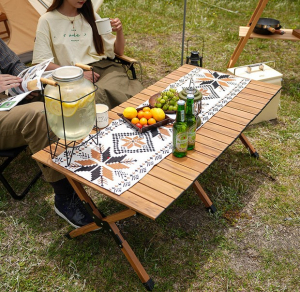News Center+ 查看更多
The Rise of Eco-Friendly Camping Tables: A Sustainable Shift in the Outdoor Industry+ 查看更多
The Hidden Perils of Traditional Materials
Traditional camping furniture has long relied on materials such as virgin plastics and wood, the production of which has led to ecological adversities including deforestation and pollution. The extraction of these resources poses a direct threat to wildlife habitats and contributes to a larger carbon footprint. It has become evident that the outdoor industry needs to address the environmental ramifications of its practices, prompting a reassessment of material use and manufacturing processes.
Strengths of Bamboo and Recycled Plastic Tables
Bamboo, a highly renewable resource known for its rapid growth, offers a robust alternative to traditional wood. It provides excellent durability and suits outdoor conditions, without the heavy toll of deforestation. Moreover, bamboo cultivation requires no chemicals, ensuring a lower impact on the environment. Similarly, tables made from recycled plastics champion the cause by repurposing waste materials, decreasing the reliance on new plastics, and mitigating the effects of pollution. Both materials not only exemplify eco-friendliness but also meet consumer expectations for quality and longevity.
The Innovative Path Forward
The green transformation within the outdoor industry is more than a trend; it's a necessary progression towards sustainable practices. Companies are increasingly investing in research and development to expand the use of alternative materials. The focus is not merely on reducing harm but on creating a positive impact. Innovations like biodegradable composites and zero-waste manufacturing processes are setting new standards, reflecting a future where the industry operates in harmony with the environment.
The rise of eco-friendly camping tables epitomizes a broader commitment to sustainable development. By embracing materials like bamboo and recycled plastics, the outdoor industry is redefining its relationship with nature. Consumers are not just purchasing a product; they are investing in a philosophy that values the preservation of our planet. As this wave of eco-consciousness sweeps across the market, it paves the way for a future where outdoor recreation and environmental stewardship go hand in hand.
Conclusion
The introduction of camping tables made from bamboo and recycled plastics is a beacon of hope in the journey towards a more sustainable future. It is a chapter in the larger narrative of an industry taking accountability for its environmental impact and consumers who are increasingly aligning their purchases with their principles. The outdoor industry's pivot to eco-friendly materials is not just about innovation; it's about survival, responsibility, and the collective pursuit of a greener tomorrow.

